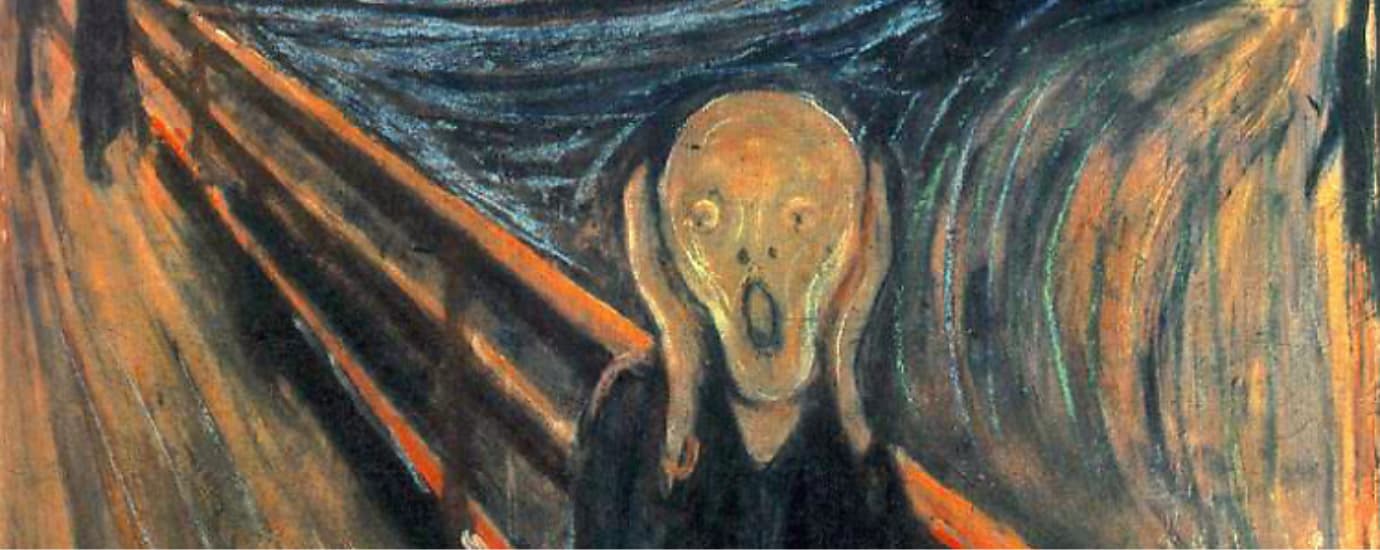Portrait of Edvard Munch, the scream of a genius!
- 12/08/2022
BIOGRAPHY OF AN EXPRESSIONIST GENIUS
Edvard Munch is certainly one of the major pioneers of expressionism. He is undoubtedly one of the greatest painters of the early 20th century. His work of art was condemned by a part of public opinion and taken as an example by the Nazis to illustrate the degeneration of art. Death struck his family on several occasions and he fell prey to many ills. However, as is often the case in art, posterity will overcome the misfortunes of a human life to enshrine his paintings in posterity.
Here is one of his most beautiful quotes to illustrate the inner landscapes of this legendary artist:
"Over the blue-black fjord hung clouds red as blood and like tongues of fire. My friends were drifting away and, trembling with anguish, I became aware of the great infinite cry of nature."
A childhood marked by death
Edvard Munch was born on 12 December 1863 in Loten, Norway. In 1864, the artist's family moved to the future Oslo, then called Christiania. The young Edvard was only five years old when his mother died of a pulmonary haemorrhage, following tuberculosis. He moved in with his aunt, Karen Bjølstad, who quickly spotted Edvard's talent for drawing. The aunt was an amateur painter and supported her nephew in developing his artistic skills.
In 1877, when the young prodigy was 15 years old, his older sister died of tuberculosis. Several of the artist's works express Edvard's pain and trauma following this new family tragedy.
BIRTH OF A VOCATION: PAINTING
His father enrolled him at the Technical School in the capital to become an engineer. However, like all geniuses, the young man would thwart his father's career plans. The following year, in 1880, he chose to devote himself to painting. In 1881, he entered the Royal School of Drawing in Christiania.
During his art studies, he was guided by the naturalist painter and writer Christian Krohg. Krohg introduced him to Frits Thaulow, who was the brother-in-law of a certain Paul Gauguin. This enabled him to obtain a grant to travel to Paris for three weeks in 1885. He became fascinated with the artistic achievements of Impressionists such as Edouard Manet.
Back in Norway, Edvard began his masterpiece, The Sick Child. He also became involved with an anarchist-oriented group. In the summer of 1885, he began an adulterous relationship with Milly Thaulow that lasted until 1888. He became jealous and suffered from hallucinations.17.jpg)
European Peregrinations
In 1886, Edvard Munch exhibited some of his paintings in the capital, some of which provoked public indignation, particularly his painting The Sick Child. A second grant, acquired in 1889, enabled him to organise a second stay in Paris during which he discovered the paintings of Vincent Van Gogh and Paul Gauguin. He lived in Neuilly and then in Saint-Cloud. On learning of his father's death, he expressed his suffering, but also his solitude, by painting Night at Saint-Cloud.
In 1890, he moved to the Danish capital Copenhagen and then on to Hamburg and Nice. This was the occasion for him to paint his famous canvas: The Scream. In 1892, he was invited to Berlin to exhibit some fifty of his paintings. Although his paintings scandalised the local press, this exhibition gave him artistic recognition in Germany. During his period of residence in Berlin, he frequented many Norwegian expatriate artists.
Between recognition and despair
Edvard went to Paris for a third time in 1894 to learn the techniques of lithography and etching. The following year, another death struck his family circle. His brother Andréas passed away. In 1896, in the studio of Auguste Clot, he produced his first chromolithographs and woodcuts with a particular innovation, in puzzle form.
Edvard Munch's misfortunes were not over, as in 1898 he learned that his other sister, Laura, had been interned because of her schizophrenia. He began a relationship with Tulla Larsen that lasted four stormy years. Wishing to end their affair, Edvard causes Tulla to attempt suicide. When he managed to get hold of the gun, a shot was fired and tore off a phalanx of his right hand.
In 1908 - 1909, Munch asked to be admitted to a special clinic to treat his depression and alcoholism. He wanted to be treated with electrotherapy. This sombre stay was marked by the award of the Royal Order of St. Olav by his native country. This was a real recognition for him. In 1909 he moved to Kragerø to paint mainly landscapes and portraits.
In 1916, the Norwegian painter bought a house and added a studio in Ekely, near the capital. In 1930, he almost went blind in his right eye due to an eye hemorrhage. In 1933, the Norwegian state made him Grand Cross of the Royal Order of St. Olav.
Discover the collection inspired by the artist Edvard Munch
In the turmoil of the Second World War
The Norwegian did not escape the criticism of the new order in Germany. In 1937, 82 of his paintings were presented by the Hitler government at an exhibition entitled "Degenerate Art". In the spring of 1940, Norway was invaded by the German army. Munch feared that his works would fall into the hands of the Nazis. He therefore wrote a will in which he bequeathed all his paintings to the city of Oslo.
On 19 December 1944, the Norwegian resistance destroyed a quay in Oslo. The blast hits Munch's home in Ekely. His windows were shattered. Although already weakened by bronchitis, Edvard goes out into his garden and procrastinates. He does not know what to do. His health worsens, so that on January 23, 1945 he dies in his house. In fact, the Norwegian capital inherited the works in his house in Ekely. The inventory is impressive: 15,000 etchings, lithographs and woodcuts, 1,500 watercolours and drawings and about 1,000 paintings.
Read more articles about Edvard Munch :
🎨 The secret of Munch's scream
🎨 Munch's 9 most famous works















